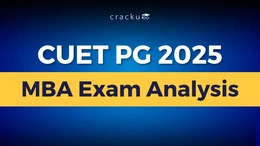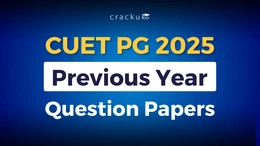Cracking the CUET PG 2025 Exam is a significant milestone for any aspiring graduate student aiming to pursue higher education in India. CUET for postgraduate studies is a rigorous examination designed to assess candidates' knowledge, aptitude, and skills in their respective fields of study.
With 1 month remaining, it's crucial to approach the exam with a strategic mindset and effective preparation. Following are the proven strategies and tips to help candidates crack CUET PG (COQP12) 2025 exam and achieve success in their academic pursuits.
Also, check: CAT Exam Syllabus 2025
CUET PG Syllabus: English/Comprehension
| English Grammar | English Usage Errors | Jumbled Para |
| Sentence Correction | Sentence Improvement | Reading Comprehension |
| Paragraph Completion | One-word Substitution | Synonyms |
| Antonyms | Idioms | Phrases |
CUET PG Syllabus: Maths/Quantitative Ability
| Ranking Tests | Linear Inferences | Arrangements |
| Matrix Arrangements | Number Series | Sequencing |
| Statements Arguments | Non - Verbal Reasoning | Symbol Based Problems |
| Cause and Effects | Coding and Decoding | Statements, Assumptions |
| Statements and Conclusion | Analogy Test | Direction and Distance Test |
CUET PG Syllabus: Data Interpretation
| Pie Charts | Line Charts | Bar Charts |
| Tabular Charts | Mixed Graphs | Data Sufficiency |
| Graph Number Systems | Tabulation | Sets and Venn Diagrams |
CUET PG 2026: Exam Pattern
Begin by thoroughly understanding the exam pattern, including the number of sections, types of questions, and marking scheme. This will help candidates tailor their preparation accordingly. Refer to the table below to know the CUET PG 2026 exam pattern.
| Particulars | Details |
| Date of Examination | March 13 to March 31, 2026 |
| Exam Code | COQP12 |
| Mode of Exam | CBT |
| Medium of Exam | English & Hindi |
| Question Type | MCQ |
| Duration of Exam | 105 min |
| No. of Questions | 75 |
| Marking Scheme | +4 marks for correct response -1 marks for incorrect response 0 marks for unattempted response |
Preparation Tips for CUET PG
Know the Exam Syllabus: Candidates should be well-versed with the topics that will be asked in the exam. Following is the syllabus as described on CUET PG (coqp12) official site.
Create a Study Schedule: With 1 month remaining in the exam candidates need to Develop a structured study plan that allocates time for each section of the exam. Consistency is key, so ensure you stick to your schedule rigorously.
Focus on Strong Areas: Candidates need to identify their strengths and weaknesses. Allocate more time to strengthen weak areas, but also ensure to maintain proficiency in your strong areas. Refrain from picking up on any new topics now
Solve PYPs and Mock Tests: Attempt past year papers to identify specific questions that come in exams and learn how to solve those questions. Start incorporating mock tests into your daily routine. Mimic exam conditions by timing yourself and analyzing your performance to identify areas for improvement.
Time Management: Candidates should learn to manage their time effectively during the exam. Allocate time to each section and practice solving questions within the stipulated time.
Regular Revision: Schedule regular revision sessions to reinforce concepts and improve retention. Revision is crucial to solidify your understanding of the topics and identify any gaps in your knowledge.
Seek Guidance: Don't hesitate to seek guidance from teachers, mentors, or peers who have successfully cleared similar exams. Their insights and tips can prove invaluable in your preparation journey.
Stay Confident: Finally, maintain confidence in your abilities and preparation. Trust in the hard work you've put in and approach the exam with a calm and confident demeanor.
Remember, the journey towards success is not always easy, but with dedication, perseverance, and the right approach, you can overcome any challenge that comes your way. Stay focused, stay motivated, and trust in your abilities. Best of luck to all the candidates embarking on this exciting journey towards higher education excellence.
Also Read, CUET PG MBA Colleges List 2025, University, Placements, Fees




























